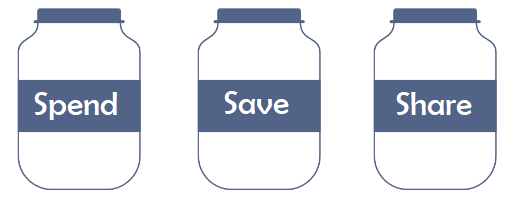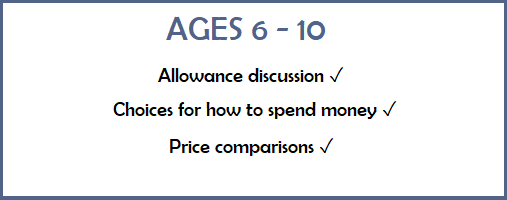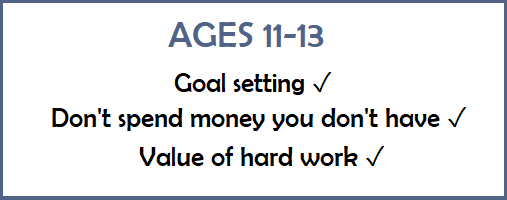Raising Financially Responsible Children
FOR CLIENTS
Amyr Rocha Lima, CFP®
7/9/20215 min read
According to studies, children as young as three years old can understand the concepts of saving and spending.
The earlier parents begin teaching and discussing money with their children, the more comfortable they will be with these concepts.
Creating financially aware children entails teaching them that wealth isn't just about money, but also about the resources they accumulate over time.
Material resources like homes, cars, and computers, as well as non-material resources like skills, health, and knowledge, all contribute to a full, rich, and happy life.
In this blog, I would like to share some money lessons and activity ideas for kids of all ages, which you can apply in your own family.
AGES 3-5: Making Spending Decisions
This is the time to teach your children about patience, and having to wait to purchase for something you really want.
This is a difficult concept to grasp for people of all ages!
And in our current culture of "instant gratification", where children are bombarded with hundreds of adverts per day, it is critical that children learn that for most purchases that are not necessities, they have to save money first in order to buy the item.
Tactical Tip: Make three jars, one for saving, one for spending, and one for sharing. When your child receives money, divide it equally among the jars. Allow them to use the spending jar to make small purchases such as candy or stickers. Money in the sharing jar can be given to someone you know who is in need or donated to a friend's cause.
Amyr Rocha Lima, CFP® is a financial planner who specialises in working with successful professionals age 50+ to help them reduce taxes, invest smarter and retire on their terms.


AGES 6-10: Creating Spending Plans
This is the time to start teaching your children about creating spending plans for their money. At this age, it's critical that children understand that money is limited and that once you've spent it all, there's nothing left to spend.
Tactical Tip: Start discussing some of your financial decisions with your children. At the supermarket, for example, explain to them that you prefer to buy the generic peanut butter to brand-name one because it costs 50 pence less and tastes the just as good. Or, talk about ways to save money, such as buying everyday necessities like paper towels in bulk to get a lower per-item price.
Consider giving your children £5 to spend at the supermarket and letting them choose what vegetables to buy within the parameters of what you need to give them the experience of making financial decisions. Get them to make a shopping list and stick to it, not purchasing anything else besides the items on the list.
Also, try speaking aloud about how you make financial decisions, as an adult, asking questions like "Is this something we really, really need?".
Finally, this is a great a age range to start talking to your children about philanthropy, giving back, and donating money. It is energising and exciting for children to feel like they are contributing to something bigger than themselves.
Whether they choose to donate some of their allowance to a charity or volunteer time doing community service, these opportunities make children feel useful and provide excellent teaching opportunities.
You could even consider bringing them into a conversation with your financial planner when they are a little older.


AGES 11-13: Making Money Grow
The sooner your children starts saving, the faster they'll see their money grow due to compound interest. At this age, introducing long-term vs. short-term goals will help children begin to think about the future and any actions they might need to start taking now.
Using specific numbers to describe compound interest is more effective than describing it in the abstract. You could say, for example: "If you start saving £100 per year at the age of 14, earning 4.97% interest per annum, you'll have £23,000 by the age of 65. But if you start at the age of 35, you'll only have £7,000 by the age of 65."
Consider calculating compound interest with your children using the Bank of England's online calculator. They can see how much money they will make if they invest a certain amount and it grows at a certain rate of return. And consider developing this conversation further, encouraging your children to set a longer-term goal that is more expensive than the toys they may have been saving for.
You could also consider discussing opportunity costs and trade-offs by sharing the family budget, discussing the family's expenditures vs. income on a weekly, monthly, or annual basis.
By sharing your family's cost of living with your children, you have the opportunity to set a good financial example of how to maintain financial control and responsibility.


Don’t be afraid to say “No!”
It is critical that you do not give in to every request made by your children.
If you continue to simply give in to avoid the hassle, you could be doing more harm than you realise.
Giving in may influence future decisions by teaching children that it is acceptable not to turn down one of their own desires, and you are then raising standards that they may not be able to maintain later on, leading to reliance on credit cards.
Teaching your children financial responsibility at a young age is doable and can set them up for a lifetime of stability and success.
I, for one, have observed that families who prioritise involving children in wealth discussions have greater long-term wealth and a richer family legacy than those who do not.
“I worked with Amyr on my long-term retirement planning. No ask was too difficult, no question left without a very clear answer and often he identified further areas to explore, creating more work for himself and more value to me. The cherry on the cake was simply how pleasurable it was to work with him.”
Yossi Dahan
(Director, Microsoft)
*****
“I would like to wholeheartedly endorse my financial adviser, Amyr. You would have to go a long way to find a kinder, patient and more honest person. A truly nice guy who is a pleasure to deal with.”
Jeanette Edmiston
(Partner, Cushman & Wakefield)
*****
“We worked with Amyr over a number of months to build a financial plan as a basis to enter retirement. Amyr is very personable, approachable and has demonstrated throughout a depth of knowledge, experience and foresight supported by a clarity of communication to enable us to confidently enter this phase of our lives.”
Paul Toolan
(Programme Director, Xoserve)
*****
Here's what clients say
Let's chat
Ready to start building your financial plan?
Then you can book a free, no obligation call with me.
We'll have an initial conversation to better understand your requirements and to see whether my services would be a good fit.


Full Disclosure: Nothing on this site should ever be considered to be advice, research or an invitation to buy or sell any financial products.
Copyright © 2025, Amyr Rocha Lima
Free Guide
Let's Connect
Chartered Financial Planner | Kingston upon Thames

